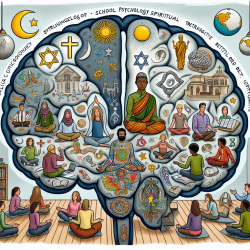Introduction
In the evolving landscape of school psychology, the importance of addressing religious and spiritual diversity is becoming increasingly apparent. Recent research, such as the study titled An Exploratory Study of School Psychology Students’ Perceptions of Religious and Spiritual Diversity Training in their Graduate Programs, highlights significant gaps in training related to these critical aspects of cultural identity. This blog will explore how practitioners can enhance their skills by integrating these findings into their practice.
Understanding the Research
The study surveyed graduate students in school psychology programs to assess their perceptions of training related to religious and spiritual diversity. The findings revealed that while students acknowledged the importance of these areas, they received minimal training compared to other diversity aspects like race, ethnicity, and socioeconomic status.
Key results indicated that practicum experiences were the most effective in preparing students to handle religious and spiritual diversity, suggesting a gap in formal coursework. This lack of comprehensive training can hinder school psychologists' ability to provide culturally responsive services, which is essential for fostering inclusive educational environments.
Why Religious and Spiritual Diversity Matters
Religious and spiritual beliefs significantly influence individuals' worldviews and interactions. For school psychologists, understanding these dimensions is crucial for several reasons:
- Social and Emotional Development: Research shows that students with higher levels of religiosity and spirituality often exhibit positive well-being indicators, such as happiness and academic achievement.
- Coping Mechanisms: Many students rely on religious and spiritual resources to cope with challenges like grief and trauma.
- Inclusive Practices: Addressing religious and spiritual diversity helps create a more inclusive environment, reducing the risk of marginalization and discrimination.
Implementing the Findings
To improve outcomes for children, school psychologists should consider the following strategies:
- Enhance Training Programs: Graduate programs should incorporate comprehensive training on religious and spiritual diversity, emphasizing both theoretical knowledge and practical application.
- Leverage Practicum Experiences: Practicum placements should be designed to provide exposure to diverse religious and spiritual contexts, allowing students to apply their learning in real-world settings.
- Continuous Professional Development: Practitioners should engage in ongoing learning opportunities, such as workshops and seminars, to stay updated on best practices in addressing religious and spiritual diversity.
Encouraging Further Research
While this study provides valuable insights, further research is needed to explore the impact of religious and spiritual diversity training on professional practice. School psychologists are encouraged to contribute to this growing body of knowledge by conducting studies and sharing their experiences.
Conclusion
As champions of multiculturalism and social justice, school psychologists must prioritize religious and spiritual diversity in their practice. By doing so, they can better support the diverse needs of students and foster more inclusive educational environments. To read the original research paper, please follow this link: An Exploratory Study of School Psychology Students’ Perceptions of Religious and Spiritual Diversity Training in their Graduate Programs.










